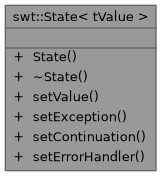Thread-safe promise state management with continuation support. More...
#include <State.h>

Public Member Functions | |
| State () | |
| Default constructor - initializes empty state. | |
| ~State () | |
| Destructor - cleanup state. | |
| void | setValue (tValue &&value) |
| Set the promise value and trigger continuation. | |
| void | setException (std::exception_ptr exception) |
| Set exception state and trigger error handler. | |
| template<typename F > | |
| void | setContinuation (std::shared_ptr< SLLooper > &looper_, F &&continuation) |
| Register continuation callback for successful resolution. | |
| template<typename F > | |
| void | setErrorHandler (std::shared_ptr< SLLooper > &looper_, F &&errorHandler) |
| Register error handler callback for promise rejection. | |
Detailed Description
class swt::State< tValue >
Thread-safe promise state management with continuation support.
- Template Parameters
-
tValue Type of value stored in the promise state
State provides the core functionality for promise/future pattern implementation with asynchronous callback execution via SLLooper integration. Key features:
- Value storage: Optional-based value storage with move semantics
- Exception handling: std::exception_ptr for type-safe error propagation
- Continuation support: Callback registration and execution
- Thread safety: Asynchronous execution via SLLooper message queue
- Template specialization: Special handling for void-returning promises
The State class acts as the shared state between Promise and Future objects, allowing thread-safe communication of results and errors across thread boundaries.
- Note
- Thread-safe when used with SLLooper for callback execution
- Warning
- Direct member access is not thread-safe - use provided methods
Constructor & Destructor Documentation
◆ State()
|
inline |
◆ ~State()
|
inline |
Member Function Documentation
◆ setContinuation()
| void swt::State< tValue >::setContinuation | ( | std::shared_ptr< SLLooper > & | looper_, |
| F && | continuation | ||
| ) |
Register continuation callback for successful resolution.
- Template Parameters
-
F Function type for continuation callback
- Parameters
-
looper_ SLLooper instance for callback execution continuation Callback function to execute when value is available
Registers a continuation callback that will be executed when the promise resolves successfully. If the promise is already resolved, the callback is executed immediately.
- Note
- Implementation in State.tpp
- Uses perfect forwarding to preserve function properties
- See also
- SLLooper
◆ setErrorHandler()
| void swt::State< tValue >::setErrorHandler | ( | std::shared_ptr< SLLooper > & | looper_, |
| F && | errorHandler | ||
| ) |
Register error handler callback for promise rejection.
- Template Parameters
-
F Function type for error handler callback
- Parameters
-
looper_ SLLooper instance for error handler execution errorHandler Callback function to execute when exception occurs
Registers an error handler that will be executed when the promise is rejected with an exception. If an exception is already set, the error handler is executed immediately.
- Note
- Implementation in State.tpp
- Error handler receives std::exception_ptr parameter
- See also
- SLLooper
◆ setException()
| void swt::State< tValue >::setException | ( | std::exception_ptr | exception | ) |
Set exception state and trigger error handler.
- Parameters
-
exception Exception pointer to store
Sets the promise to failed state and immediately executes any registered error handler if available. This method can only be called once per State instance.
- See also
- setException
◆ setValue()
| void swt::State< tValue >::setValue | ( | tValue && | value | ) |
Set the promise value and trigger continuation.
- Parameters
-
value Value to store (moved into internal storage)
Sets the promise value using move semantics and immediately executes any registered continuation callback if available. This method can only be called once per State instance.
- See also
- setValue
The documentation for this class was generated from the following files: